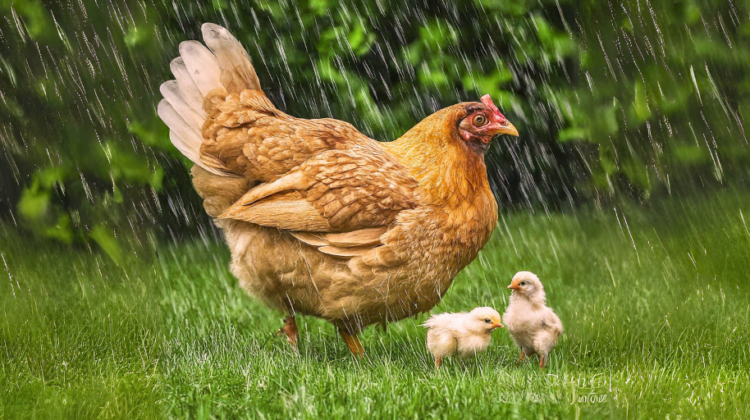
How to raise chickens in the rain? Many chicken raisers wonder about this during rainy times.
The thought of wet chickens may seem uneasy. Yet, with the right know-how, your flock can thrive even in damp weather. Understanding your chickens’ rainy day behaviors and needs is key.
Chickens are hardy birds with unique quirks. They can handle different conditions, including rain. But that doesn’t mean leaving them be when showers pour. As their caretaker, you must provide shelter and care during downpours.
This guide teaches how to raise chickens in the rain. It answers common rainy day chicken questions like:
“Can chickens get wet?”
“Do chickens enjoy rain?”
“What happens if chickens get soaked?” and more.
Let’s explore keeping chickens comfortable when it’s wet outside.
The Impact of Rain on Chickens
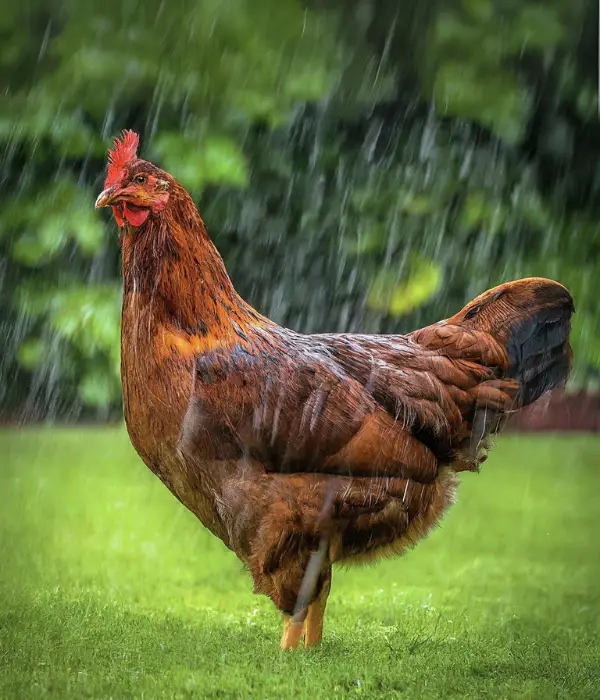
Rain does not bother chickens much. They are tough birds, and a little wetness will not hurt them.
But, too much rain and wet conditions can cause health issues and make them uncomfortable.
When it rains, chickens’ feathers get soaked. This can lower their body temperature, making them feel uneasy or even ill.
Wet chickens can also get hypothermia or frostbite more easily, especially in cold weather.
Damp, muddy coops create a perfect home for harmful germs and parasites.
These poor conditions can lead to breathing problems, foot infections, and lower egg production in chickens.
So, giving your chickens a dry, sheltered space during rainy days is very important for their well-being.
Can Chickens Get Sick from the Rain?
Can chickens get sick in the rain? The answer is yes. Even though chickens are tough birds, wet conditions for a long time can bring health issues.
When chickens stay wet, their body temperature can drop. This can lead to hypothermia or getting too cold. Cold and wet conditions can also cause frostbite in their comb and wattle.
Wet conditions make the chicken bedding damp too. This allows bad mold and bacteria to grow. These can cause breathing problems and other health issues.
Additionally, wet and muddy areas can cause foot problems for chickens, like bumblefoot. This painful condition happens from a bacterial infection in the foot pad called Bumblefoot.
So, it’s very important to keep your chickens dry and their living area clean. Protect them from rain to prevent illness. A little rain is okay, but being constantly wet can make chickens sick.
Do Chickens Like Rain?
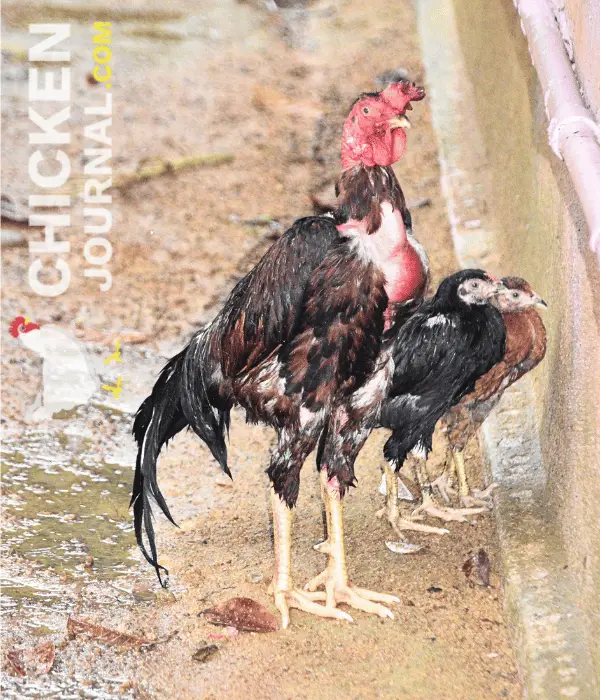
Do chickens like rain? Some do, but some don’t. It depends on the chicken.
Many chickens go inside when it rains. They do this so their feathers don’t get wet.
Wet feathers make it hard for chickens to move around. The wetness can also make chickens cold.
But some chickens don’t mind a light rain, especially on hot days. You might see them walking around in the drizzle, pecking at the ground. They don’t seem to care that they’re getting wet.
Even if chickens like the rain at first, let them go inside when they want to. You don’t want them to get too wet and cold.
So chickens can have different feelings about rain. Some enjoy it while others don’t. As long as they can go inside and stay dry, they’ll be happy.
Wet Chickens: What Happens When Your Chickens Get Wet?
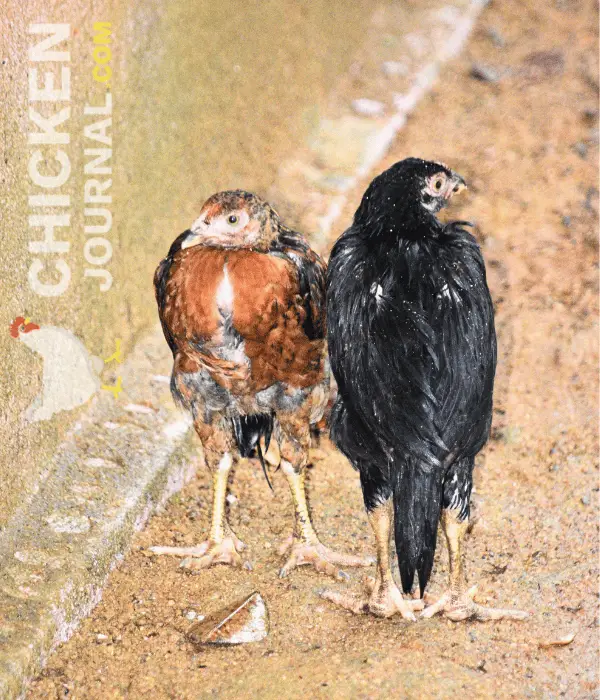
Chickens can face challenges when they get wet. Their feathers become heavy, making it hard to move freely. This is tough if they need to escape dangers.
Wet chickens also get cold. Chickens rely on feathers to stay warm. When feathers get wet, they can’t keep heat in, leaving the chicken cold. This can be very dangerous in chilly weather, leading to hypothermia or frostbite.
Damp chickens are more prone to sickness. Wet areas are breeding grounds for germs and fungi. These can cause health issues like breathing problems and skin conditions.
Rain itself doesn’t usually directly cause chicken diseases. But rainy conditions can create environments where diseases spread more easily.
Chickens are tough birds. However, when exposed to damp, unsanitary conditions for too long, their risk of various health problems increases significantly.
Rainy days can bring some health challenges for chickens. Let’s look at five common issues that can arise during wet weather:
1. First, damp and chilly conditions can weaken a chicken’s immune system. This makes them more likely to catch respiratory infections like Infectious Bronchitis or Mycoplasma gallisepticum.
2. Coccidiosis, a parasitic disease caused by tiny organisms called Eimeria, thrives in wet, dirty environments. Rain can create perfect conditions for coccidiosis to spread among your flock.
3. Excess moisture from rain can lead to muddy and dirty conditions. This increases the risk of foot pad dermatitis, also known as bumblefoot, especially if your chickens have cuts or scratches on their feet.
4. Rain can help worm eggs and larvae survive and multiply in the environment. If your chickens peck at contaminated soil, they could ingest these parasites and become infested with worms.
5. Excessive moisture encourages fungal growth, which can cause skin and feather issues in chickens. Fungal infections like Aspergillosis may become more common in damp conditions.
So, during rainy periods, keep an extra-close eye on your flock’s health and living conditions. A little extra vigilance can help prevent these wet weather woes.
Too much time spent in wet and uncomfortable spots can stress out chickens. When stressed, their bodies can’t fight germs and sicknesses as well. This means stressed chickens are more likely to get all kinds of diseases and health problems.
Shelter for Chickens: Protecting Your Flock from Rain

Taking care of chickens during rainy days requires a bit of planning. A well-built chicken coop is key to keeping your feathered friends safe and comfortable. This structure serves as their home and a shelter from bad weather like rain.
Your chicken coop should allow fresh air to flow through while keeping water out. The roof must have a slope so water can run off instead of pooling.
The flooring should be raised to prevent flooding. These features protect the chickens from getting soaked and the coop from becoming damp.
The coop needs to be spacious enough for all your chickens. They should have room to move freely and roost comfortably. Keep the interior dry and clean to stop growth of germs that could make the chickens sick.
Having a covered run attached to the coop is helpful. This allows your chickens to stretch their legs even when it’s pouring outside. Adding some perches in the run may encourage them to explore, despite the rain.
10 Tips for Raising Chickens in the Rain
Raising chickens in the rain can be a bit challenging, but with these ten tips, you can ensure your chickens stay happy and healthy:
1. Choose a well-drained location:
To avoid your chickens getting damp and the ground becoming waterlogged, be sure to place the chicken house and run in a well-drained spot. Too much wetness may result in health problems for the chicken.
Find a place with excellent natural drainage or, alternatively, set the coop and run on stilts so they are above any likely floodwaters.
2. Provide shelter:
Chickens must be protected from the rain, wind, and cold. A well-constructed coop or sheltered run will provide a dry place to rest where they can avoid becoming wet. Their shelter needs to be properly sealed and insulated so that rainwater does not leak in.
3. Use bedding materials:
Straw, hay, or wood shavings are commonly used for chicken coop bedding as they provide a dry and soft surface for the birds to rest on.
In addition, these materials help in absorbing moisture, hence keeping the chickens warm when it rains. Regularly replace the wet or dirty bedding to ensure a healthy living space for your birds.
4. Elevate the coop:
By lifting the coop a little above the floor, you can stop rain from getting inside. It also prevents the coop from becoming soaked, which can cause mold and bacteria to grow. Furthermore, raising the coop makes it less likely that rodents will build nests underneath it.
5. Sloped roof design:
A slanted roof layout permits rapid runoff of rainwater, thus preventing water from settling on the roof. Make sure that the roof is properly sealed with no cracks through which water can pass. A chicken-friendly environment should have an interior that is wetness-free and cozy.
6. Provide fresh water:
During wet seasons, it is important to ensure that chickens have clean water. Rain caps should be used for drinkers as a way of shielding them from being wet directly by the rain and also to keep the water clean. Check on the sources of water frequently and change them if necessary so they can be fresh always.
7. Provide adequate ventilation:
Sufficient air circulation stops wetness and lowers the moisture content in the chicken coop. Even with rainfall, this is because hens produce moisture when they breathe and excrete.
Lack of proper ventilation may result in a damp and unhealthy surrounding. Well-positioned ventilation allow for the free movement of clean air without subjecting the hens to cold air or rain.
8. Avoid overcrowding in chickens:
Over-crowding affects chickens by increasing their levels of stress making them more prone to sicknesses such as those related with the respiratory system, which are common during wet seasons.
To minimize infection risks and foster a healthy living environment, ensure that the house and range have enough space for each bird.
9. Limit free-range time:
It’s good for chickens to free-range, but not when it rains heavily or storms. When they are wet, the birds get cold effortlessly and are likely to be stressed too, thus compromising their health as well.
Make sure you provide them with shelter during wet periods while letting them out on dry days so that they can have some time in the open air but undercover when it’s necessary.
10. Treat and prevent mud:
During rainy periods, damp ground in the coop and run can become muddy, unsanitary and hazardous to chickens.
Mud sticks in their feet and feathers which becomes a burden when they are walking around.
To reduce mud and keep their housing clean, lay wood chips, gravel or sand in areas where chickens walk most often.
In order for the birds to remain healthy and happy even when it rains, make sure you provide them with dryness and comfort while avoiding overcrowding.
Regularly inspecting and maintaining their living coops will help you detect any problems early enough.
How To Build A Rain-Proof Chicken Coop?
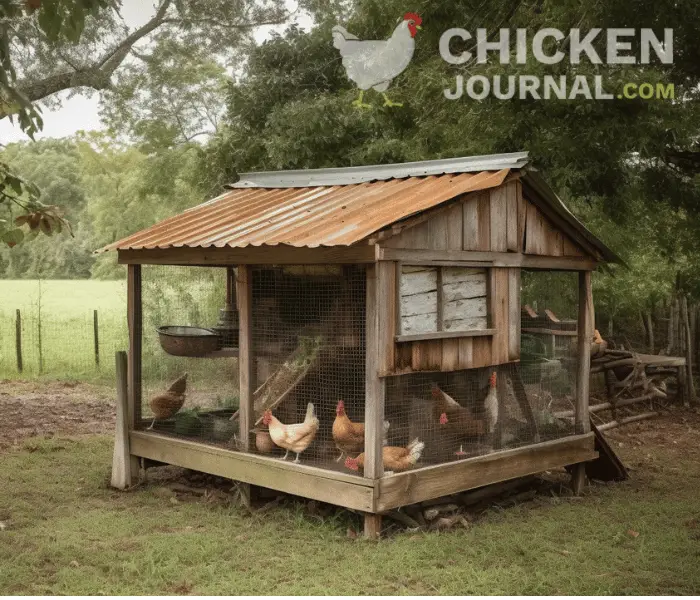
Building a rainproof chicken coop involves careful design and construction to ensure your chickens stay dry and comfortable even during wet weather.
Here’s a step-by-step guide on how to build a rainproof chicken coop:
Step 1: Choose a Suitable Location or Area
Choose a spot that is a little higher for the construction of the coop. This is done so that water does not settle around it. Raising the coop above the ground will save it from getting waterlogged both on the inside and outside during rainy days.
Always go for places with good natural drainage when picking where to put up your chicken house. Quick removal of rainwater from such an area is made possible through this. It also ensures there is no waterlogging.
Step 2: Choosing Right Design and Materials
Construct a sloping roof with eaves on all sides. It will help to drain rainwater away faster and stop it from getting into the coop.
Select metal or asphalt shingles as roofing materials that are waterproof and can withstand bad weather. If the roof has already been made of wood, cover it with a good quality tarpaulin instead.
To protect against rain, use plywood or treated lumber for the walls as they are durable and resistant to water damage.
Step 3: Do The Construction

Build a firm and flat base for the coop so that water cannot seep in from the ground. To keep rainwater from getting into the structure, the foundation should be raised by one half to one foot above ground level.
Construct a strong frame out of treated lumber. Ensure that the frame is level and square at all corners. Longer life span for your chicken coop is achieved by using good quality wood. You can also paint it for more protection against environmental elements.
Attach roofing material while making sure there is enough slope for water run-off. Fasten the roof securely to prevent it from being lifted by the wind during heavy rains.
Install the siding, leaving space at the bottom for ventilation and drainage.
Step 4: Proper Ventilation Needed
Adding a few chicken coop fans and incorporating strategically placed vents into the design will help keep air circulating inside the coop while also preventing condensation from forming.
Step 5: Understand Flooring and Interior
The floor should be raised or have a slight slope, so that water cannot enter the coop. Gravel and sand are good materials for drainage.
Cover the floor of the coop with a bedding material such as straw, wood shavings or sand to keep it dry and comfortable inside.
Step 6: What Needs For Rain Protection?
Make sure the roof overhangs enough on each of its sides for more protection against rain splash.
Put up gutters along the edge of the roof so that they can gather rain water and take it away from the foundation of the coop.
Step 7: Rain Maintenance Information
Check out your poultry house to find any places that water could get in. Straight away, fix any holes or cracks you find.
Clean the inside of the coop regularly and change any wet or dirty bedding so that it stays dry and germ-free. You can use washable or non-washable nesting box pads for hens that lay eggs regularly.
By following these steps, you can make a rainproof chicken coop which provides a dry, comfortable space even for your poultry during rain.
It should be noted that the correct building materials should always be used, detailed attention paid during construction and regular maintenance done to keep this structure effective in protecting the flock from wetness.
Should You Allow Your Chickens Out in the Rain?
To let your chickens go out in rainfall or not is dependent on some factors.
If it is a light shower, your chickens may enjoy it, but when it is heavy rain; keep them inside their coop.
However, you should also be aware of when the unexpected clouds will shower your chickens. In such a case, they would seek refuge from rain underneath shades of trees or inside the coop.
Ensure that if the weather becomes uncertain, your free ranging birds should have shelters nearby
Additionally, observe both the climate conditions and their behaviors. Whenever they seem uneasy or cold, guide them back into the coops.
Conclusion: Ensuring Your Chickens Are OK in the Rain
Chickens can tolerate rain, but extended exposure may cause them ill health and discomfort.
It is important for chicken owners to know that rain is not harmful to their chickens. Providing waterproof coops, dry and clean bedding as well as covered runs will shield chickens from getting wet when it rains.
Just like humans, every chicken has its own preferences. Some may love being out there in the sprinkles; others may want nothing more than to stay inside.
Therefore, always observe how your birds are behaving during different weather conditions and adjust care accordingly. This way one can successfully keep poultry during rainy seasons with adequate preparedness and knowledge.
Did this brief guide help at all? Then share among friends who keep hens too. We need all hands on deck for our feathery buddies whether it’s dry or wet outside!

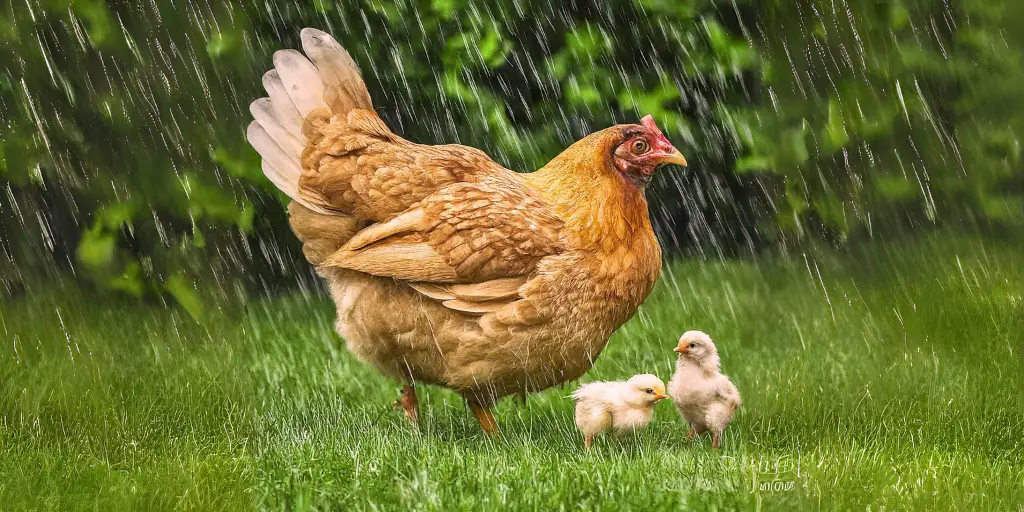

Leave a Reply